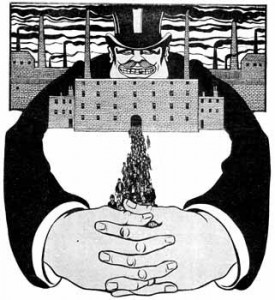Radical Education
It was often difficult and dangerous during the communist years for Poles to read what they wanted or study the subjects they desired. Teachers felt compelled to gloss over many aspects of Soviet history, information about political and economic topics was tightly controlled, and philosophical approaches other than Marxism merited little attention in the classroom. The most volatile subjects – such as Polish resistance movements – could not be mentioned at all except in the most expurgated fashion.
To remedy this situation, Polish activists and academics in the 1970s revived an earlier tradition: the “flying university.” Economists and sociologists taught forbidden books and ideas. Political scientists discussed issues of democracy and civil society. Cofounder Jacek Kuron of the Committee for the Defense of Workers and former student firebrand Adam Michnik explored the lessons of earlier Polish uprisings against the state. Classes took place on the run as teachers changed venues to keep ahead of the police. Thanks to sympathetic professors who secretly served as their tutors, students who were kicked out of university for political reasons could complete their studies.
This flying university of the communist era hearkened back to the first such Polish experiment of the 19th century when young women, barred from Polish universities, attended classes in private residences taught by professional historians, philosophers, and scientists. One of the most famous graduates of this underground experiment in radical education was Maria Sklodowska (Marie Curie), who received a second Nobel Prize in 1913 for her discovery of the elements radium and polonium. The flying universities of the 19th and 20th centuries made education a vital part of the transformation of Polish society and served to inspire movements throughout Europe and beyond.
In its most conventional form, education is the means by which society shapes young people to conform with “mainstream” values and norms of behavior. But there have long been more subversive and radical approaches to the imparting of knowledge. Socrates set the standard with his thoroughgoing questioning of the philosophical and political underpinnings of Athenian society (which led in part to the charge that he corrupted the youth of Athens). Voltaire, Wollstonecraft, Jefferson, Hume and others, who formed a loose band of philosophesthat launched the Enlightenment of the 18th century, attacked the pieties of the old order of religious orthodoxy and called for more liberating educational approaches.
Perhaps the most radical educational program came from Jean-Jacques Rousseau in his work Emile, with its emphasis on experiential learning. Rousseau’s radical departure from formal schooling techniques influenced successive generations through Friedrich Froebel’s Kindergartens of the 19th century and the Modern School Movement of the early 20th, the pioneering work of Jane Addams and Hull House, and the progressive educational theories of John Dewey. The theories of the Brazilian Paulo Freire gave greater credence to popular education, the importance of dialogue between people rather than the hierarchy of teacher-student, and the connection between literacy and liberation.
Today, radical educators are involved in a variety of initiatives that, like the flying universities of Poland, respond to the needs of specific communities. Some educators are working hard to revamp public schools. Others have placed an emphasis on charter schools and home schooling. Some have challenged the hierarchy, overspecialization, and stasis of academe. Others like Ivan Illich and John Holt have gone so far as to recommend a radical return to Rousseau’s original ideas and eliminate formal schooling altogether in favor of learning through doing and experiencing.
What ultimately is the purpose of education: to help raise children to contribute to society as it is current constituted – i.e., to maintain the status quo – or to question the foundations of society in order to make it better? Should education provide students with answers or with questions? Should the educational systems of Japan and South Korea be praised for producing students with outstanding test scores or criticized for their mind-numbing curricula and uncreative practices? Does public education in the United States require more funds or a more fundamental rethinking? Do charter schools promise a democratic turn in education or the further privatization of public life? Do new technologies like the Internet offer students more democratic access to information or promote the laziest of research methodologies? What role does a familiarity with print culture have in an increasingly visual age?
On a trip to Provisions, you can find out everything about American history that they didn’t teach you in school in Howard Zinn’s A People’s History of the United States, pick up some helpful hints from the magazine Radical Teacher, log on to explore the impact of critical theory on education at Rage and Hope, listen to interviews with educators at Bayview One O’ One, and get a peak into the world of Iranian education in the film Blackboards.


